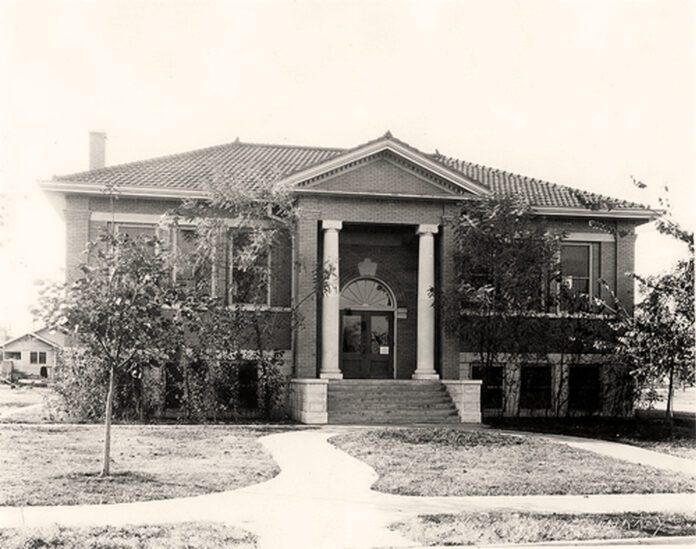
On July 31, 1956, Columbia Pictures released a movie titled Storm Center. Starring Bette Davis as a small-town librarian, it’s been called the first feature film to directly confront the excesses of McCarthyism. (Named after its figurehead, Wisconsin senator Joe McCarthy, McCarthyism was a Cold War phenomenon that sought zealously to root out and ruin communists and their fellow travelers in government, the entertainment business and elsewhere, ultimately destroying the reputations of many of the innocent as well as the guilty.) It was directed by Daniel Taradash, who’d won an Oscar for scripting From Here to Eternity a few years earlier.
The picture’s credits open over a page from the 1859 book On Liberty, written by the famed philosopher John Stuart Mill and including the passage, “Strange it is that men should admit the validity of the arguments for free speech but object to their being ‘pushed to an extreme,’ not seeing that unless the reasons are good for an extreme case, they are not good for any case.”
The case in Storm Center involves a book called The Communist Dream, which librarian Alicia Hull (played by Davis) refuses to pull from her shelves, igniting a firestorm of controversy that rages through the town of Kenport. Kenport, in fact, is actually Santa Rosa, California, where Taradash shot much of the movie.
While Kenport was fictional, McCarthyism was, of course, very real. And while Storm Center is fiction, it also was inspired by real-life events – not in Santa Rosa, California, but in Bartlesville.
A little over 74 years ago, Bartlesville city librarian Ruth Brown was relieved of duty by the city’s commission’s library board. According to a July 27, 1950 piece in the Tulsa Tribune, Brown had been fired “after an investigation of reports that Communist literature was sent to the library.” (The story, incidentally, was dated a day before her 59th birthday.) It was this action that ignited the events that formed the inspiration for Storm Center, released six years later.

Brown had taken her position with the Bartlesville Public Library back in 1919. According to her Oklahoma Library Legends biography on the Oklahoma Library Association website (oklibs.org), she was deeply involved in making sure that the library services extended to Bartlesville’s African American community. In those segregated days, any attempt at building social equality between Black and white people was met in many quarters with hostility, and once the McCarthy Era got fully underway, communists and civil-rights advocates became conflated.
The Oklahoma Library Legends piece suggests that Brown was let go just as much for one as the other. During 1950’s “Brotherhood Month” of February, it points out, she and two Black teacher friends made a point of going to lunch together at “Bartlesville’s largest drugstore,” where they were predictably refused service.
According to the biography, “Two weeks later, Senator Joseph McCarthy exploded on the national scene with his accusations of card carrying Communists in the government. The event not only sent the country into a spin, but it also gave opponents of Miss Brown’s interracial activities an opportunity to attack under false pretenses.”
That attack wasn’t long in coming. The same month she and her companions were refused service at the drugstore, a group of Bartlesville citizens came to the city commission’s meeting to protest what they called “subversive materials” at the local library. Initially focused on The Nation, a progressive magazine which had begun as an anti-slavery publication in 1865 (and was decidedly anti-McCarthy), the list of allegedly offensive Bartlesville Library holdings grew to include New Republic, another liberal periodical, and Soviet Russia Today.
Those, apparently, weren’t damning enough to make a case for Brown’s dismissal. So, a few days later, the front page of the Bartlesville Examiner newspaper hit the stands with a front-page photo of not only the magazines, but two copies of a book called The Russians: The Land, the People, and Why They Fight by well-known American journalist Robert Rhys Williams, an advocate of socialism. All had been allegedly unearthed at the library.
Notes Brown’s Oklahoma Library Legends entry, The Russians “was published in 1943 during the time that Russia and the United States were allies during WWII. Neither copy was owned by the Bartlesville Library. It has been speculated that the library custodian, whether by agreement or coercion, had let members of the opposing group enter the area while the library was closed. No one had authorized the photo and the displayed books were never located.”
Although this setup still carries a distinct odor nearly 75 years later, and many Bartlesville residents rallied around Brown at the time, the accusations were enough to get her discharged. That happened on July 25, 1950. Her assistant city librarian, identified in the Tribune as “Mrs. A.R. Riggs,” resigned in protest the next day. According to the Summer 2001 issue of Progressive Librarian, a committee called Friends of Miss Brown “was quickly formed to publicize what had happened and to raise funds for her.” The Progressive Librarian writer, Zoia Horn, noted also that Brown was supported by the library board. That would’ve been the former library board, however. On June 14, the city commissioners had dissolved it, replacing the old members with people unsympathetic to Brown.
A couple of months later, she struck back, with a suit against the City of Bartlesville claiming her dismissal was, according to the September 13, 1950 Bartlesville Record, “in direct conflict with the state’s library laws,” specifically citing the dissolution and reconstitution of the library board. The case worked its way through Oklahoma’s justice system for a couple of years, ultimately arriving at the Oklahoma Supreme Court, where it was dismissed.
But while Ruth Brown didn’t win in court, she made an undeniable impact on 1950’s American culture. Not only did she inspire the making of a major Hollywood picture, one that struck back at McCarthyism’s excesses and in its way helped lead to the ultimate weakening and demise of the movement. She also was the catalyst for any number of public meetings and examinations of the whole notion of book and magazine censorship in public libraries and elsewhere, especially here in Oklahoma.
As would be expected, tempers on both sides remained heated, even after her suit’s dismissal. In early January, for instance, Robert Porta, Americanism officer for the Oklahoma American Legion, walked out of a public meeting at Oklahoma City’s First Unitarian Church that was being held under the title, “Are Oklahoma Libraries Being Censored?”
A next-day story syndicated by the Associated Press noted that Porta “had just taken a stand for Bartlesville’s city officials who fired the city’s librarian and banned certain publications as pro-communist. The discussion involved selection of books for the Bartlesville library.
“Among the few who followed Porta was a woman who shook her finger at the group at the First Unitarian Church and shouted: “You are communists.”
Prior to his walkout, according to the story, Porta had been detained by the church’s pastor, Rev. Frank O. Holmes, who told him, “The American who has been taught to think freely and strenuously for himself is not likely to be made a dupe by communists.”
Following her dismissal, Ruth Brown left the state, teaching at an African American school in Mississippi and then working in Colorado as a librarian until her retirement in 1961. She ultimately returned to Oklahoma and was living in Collinsville when she died in 1975, at the age of 84. According to her Wikipedia entry, she asked that her body be donated to the University of Oklahoma Medical Center.
Some years later, in 2001, OU Press published The Dismissal of Miss Ruth Brown: Civil Rights, Censorship, and the American Library, written by Louise S. Robbins. Six years after that, the Bartlesville Library began displaying a bronze bust of Brown, in addition to starting a scholarship fund in her honor. And in 2023, the library added a mural depicting Brown, sitting under a tree and reading to a mixed-race group of youngsters.






















